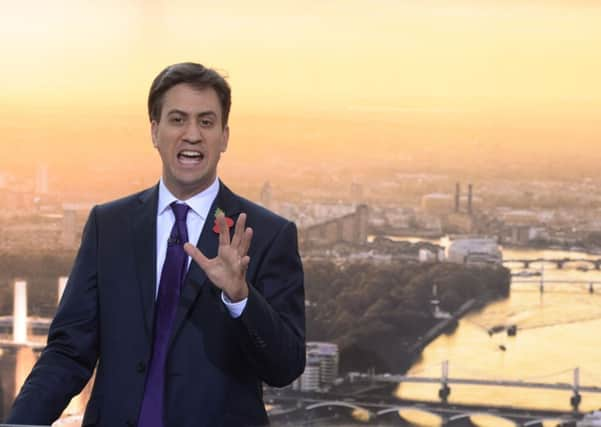Andrew Whitaker: Miliband prepares to wage war


Mr Miliband made what is very much a social justice case about what he described as unscrupulous firms exploiting cheap overseas labour and driving down overall wages.
The Labour leader’s focus appeared to be primarily on wanting to ensure there is a living wage for workers, whether they are from the UK or those who have migrated to these shores.
Advertisement
Hide AdAdvertisement
Hide AdHowever, Mr Miliband should perhaps be a little more wary. There’s always the danger that he could find himself caught up in a distasteful Dutch auction with the Tories over who can be toughest on immigration.
Mr Miliband could still make his case about the exploitation of cheap foreign labour, while at the same time stressing the benefits immigration has delivered with overseas workers contributing to the NHS and public services.
Although it would be completely unrealistic to expect Mr Miliband to set out the details of his manifesto for the 2015 election, it is perhaps likely that certain key themes will now start to emerge.
A pledge by Labour to make the Living Wage, which stands at to £7.65 outside London and is currently a voluntary option in the private sector, would improve the quality of life for many Britons.
Labour decisively won the argument over the minimum wage in 1999 when claims by the then Tory leader John Major about it leading to increased unemployment coming to nothing.
The Living Wage has largely been used as an effective campaign tool by local authorities insisting that all employees of firms benefiting from council contracts receive the rate.
However, Mr Miliband could pitch the Living Wage as the natural phase of the minimum wage, which currently stands at £6.31 for over 21s, as a major boost to incomes.
Another policy that may yet appear could be some form of public ownership of the railways.
Advertisement
Hide AdAdvertisement
Hide AdThe Labour leader will be aware transport is not normally an election winner, but the rising costs of rail travel, such as the average 2.8 per cent increase announced last week, mean it is becoming one of the major costs to many people’s budgets.
With Tory ministers effectively defending last week’s fare increase, Mr Miliband could tap into discontent over a feeling that taxpayers are paying twice for rail services with the public purse contributing £1.155 billion directly to the private rail operators in 2012.
As part of his overall policy plan, perhaps Mr Miliband will argue for the state to take over the franchise of services when private contracts lapse after the rail regulator said that the state-run East Coast rail service requires less public subsidy than the UK’s 15 privately run rail franchises.